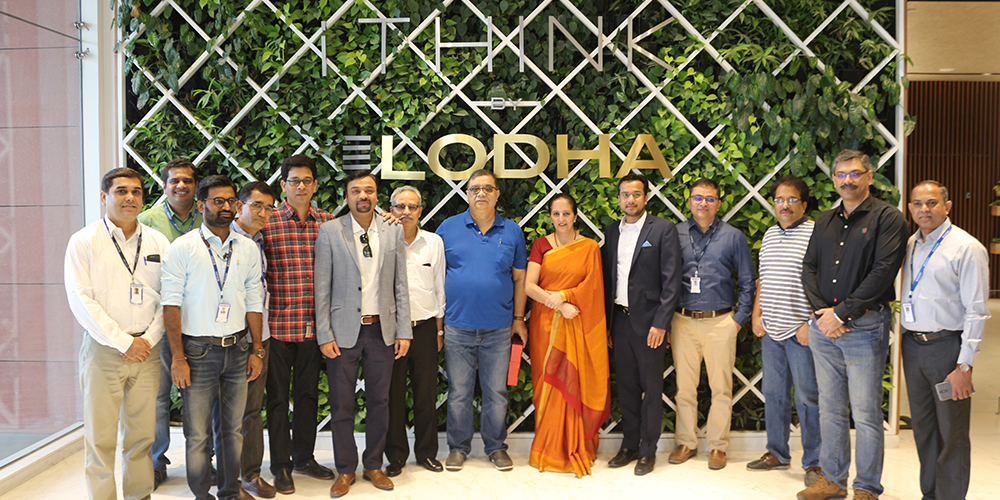
Save water in building construction
As a matter of fact, water is becoming scarcer as local sources are constantly depleting and disappearing. While urbanization and modernization are essential, we cannot ignore that growing cities and populations, coupled with changing climate, are placing unprecedented pressure on the water. According to the World Economic Forum, we may face a 40% global gap between water supply and demand by 2030. While the scenario seems grim, it also provides an excellent opportunity to work on and make water conservation a vital agenda to provide safer water and better manage our water resources for a better future.
The World Water Day theme of 2023 by the UN, “Be the Change,” focuses on accelerating change to solve the water and sanitation crisis. The aim is to encourage people of the world to implement the changes in their lives in how they use, consume, and manage water. One thing that I feel strongly about. To bring in large-scale transformations, it’s the collective job of policymakers, corporates like us, and millions of people who can take action to create the desired impact.
Nearly 120 million households in India lack access to clean water, the highest number in the world as per the UN-Water Index. As the Government intends massive housing schemes, it must consider the need for smart water management, especially under the Smart Cities Mission.
While all stakeholders and industries should focus on playing their role to play in tackling the global water crisis, it is imperative for the real estate industry to do its bit in driving the water conservation agenda along with its mission to accelerate urbanization. A lot can be done by real estate organizations that can take different measures to safeguard our freshwater sources. Therefore, the industry must lead the way in assuring that communities remain irrepressible in the face of any impending water crisis.
Ensure Water Conservation:
Consumption can be reduced by implementing simple measures like installing low-flow water fixtures in homes and offices while utilizing recycled water for secondary usages like irrigation, flushing, cooling, and different industrial purposes, further decreasing pressure on valuable water resources. Water treatment systems also ensure that contaminated water does not get mixed with the clean ground and surface water sources. More advanced treatment systems like IPR or DPR (indirect or direct potable reuse) make treated water to be used for potable or primary purposes. These treatment systems have been successfully executed at scale in many instances.
One of the fundamental ways to ensure water conservation is by measuring its usage. It is accurate for water conservation also; water metering is essential to limit water consumption and create awareness among the users and communities about their demand profiles. Simple awareness campaign activations can be done for all the stakeholders, making it more effective if backed by relevant and authentic consumption data.
Even the best-designed water networks have leakages; if they are not rectified, they can end up with a huge water loss. Using good quality materials in water distribution, regular preventive maintenance through continuous monitoring, and fixing any leakages in the system by using technology can prevent a considerable amount of water wastage.
Responsible water consumption also calls for the development of landscapes built with native species that are strong and which use less water than non-native varieties. Newer irrigation methods like drip irrigation and timed release of water are practical measures that can be adopted while developing smart climate-conscious designs.
Safeguard the Water Resources:
It is important to safeguard and ensure that the polluted water is not mixed with natural water resources. Steps to water safety involve treating water to a minimum required quality that can be later released into natural water bodies, deployment of filtration chambers, and oil interceptors in the drainage systems.
Floods are also one of the major reasons for water contamination; preventing them in the buildings by carefully assessing the risks and deploying the correct and essential mitigation measures ensures that the underground reservoirs and groundwater sources remain guarded against the polluted flood water. This can also help protect people from water-borne diseases resulting from contaminated water.
Restoring Water Resources:
As per a report by the Central Ground Water Board of India, India has also reached alarming levels of groundwater exploitation for self-use and agriculture. The levels are this high because India is believed to be the home to 1/6th of humanity, while it only has 4% of global freshwater resources.
This can pacify by ensuring rainwater recharge and harvesting for replenishing the aquifers and surface water resources. Effective rainwater harvesting technique is one of the best techniques to help with water resilience. Restricting runoff by limiting the excessive concretization of urban areas is another way to reinvigorate natural water sources. Urban runoff is a complex term resulting in the loss of valuable and abundant rainwater and is a concerning cause of water pollution. Softer landscapes, abundant greenery, and natural ground hydrology helps us to rejuvenate the exploited & vulnerable water sources available to us.
Some of these aspects mentioned above are mandated by regulations, while green building certification bodies require only a few. Many elements are kept open for voluntary adoption by real estate developers and societies. Once we realize that it is our duty to make this planet a better place to live for our future generations, climate-responsive and adaptive design implementation will become a regular practice for every real estate developer. On World Water Day, we must come together, acknowledge our responsibility, and pledge action to make a water-positive future.
- Aun Abdullah, ESG Leader, Lodha
Published in The Hindu
TAGS
Similar Blog Posts

Pivot or Perish: The Real Es...
Mint’s Pivot or Perish webinar held last month focused on the impact of COVID-19
TAGS

Homebuyer Trends That Are Re...
In the past decade, the concept of luxury has experienced an evolution from something that was sy
TAGS

New Homebuyers Looking for O...
The right balance between nature and modern infrastructure has inspired people to live in one of
TAGS

Powai: A Prime Real Estate H...
Witnessing the huge demand and the growth prospects, Grade A developers are fortifying their pres
TAGS

Green Advantage...
Today, environmental sustainability is key in homebuying and investment decisions. Grade-A develo
TAGS

Lodha Pay – Book your Drea...
Lodha Pay is introduced to provide safe and secure, online payment option to our customers.<
TAGS
Services
Green And Sustainable Living...
Our homes are safe havens for us and our families. With a significant change in lifestyles and th
TAGS

How Homeownership Helps in E...
A child’s environment plays a major role in their development because it includes the surroundi
TAGS

Building green homes: planet...
Studies show that green buildings can save up to 30% of energy and 50% of water. Builders can swi
TAGS

Changing housing paradigm bo...
A home is no longer just a substantial investment – it offers the security of a much deeper, mo
TAGS

Benefits of Investing in Rea...
Here we take a look at the benefits of investing in real estate, the various sops available for w
TAGS

Ensuring quality is at the f...
The real estate sector in India has been multiplying over the past few years. With increased popu
TAGS

How living on rent can impac...
When moving to a new city for employment, rather than buying a house people preferred renting a h
TAGS

The journey of women from ho...
According to a report by Investment banker Morgan Stanley, millennials are a key force that drive
TAGS

South Central Mumbai: Hub fo...
One of the finest locations in the city of Mumbai - South Central Mumbai is house to some of the
TAGS

It is time to take the leap ...
Owning a home is an essential priority for each individual and an aspiration that one desires to
TAGS

Building a better life, shap...
During the last few decades, we have grown as a company, and a nation, at an unprecedented rate.
TAGS

Why This is The Right Time t...
Over the past couple of years Mumbai has undergone a sea of transformation. With several key infr
TAGS

Shifting consumer preference...
The last two years have been filled with life lessons for every individual. This has been a time
TAGS

HDFC Bank anchors at Palava...
The first commercial tower of Lodha Group’s Palava, recognized as India’s No.1 Liveable City*
TAGS
palava offices
Why real estate continues to...
Given that real estate is always under scrutiny, it is evident that most people don’t understan
TAGS

Mumbai upbeat on digital pus...
RERA is an Act to establish a regulatory body for regulation and promotion of the real estate sec
TAGS
Digital
Redefining real estate, deve...
With meticulous planning, attention to detailing, focus on quality & great craftsmanship we h
TAGS

Thane the Most Preferred Loc...
A larger, more popular subject usually overshadows a small one. This can be true for people, plac
TAGS

HDFC Bank Welcomed at iThink...
Shaishav Dharia, Regional CEO, Lodha Group, welcomes Ms. Ashima Bhat , Country Head - Finance, St
TAGS
palava
The Rise of Hospitality in M...
As the world of luxury has shifted away from a high price tag and brand/product-centricity and mo
TAGS
Luxury
Sustainable Real Estate: The...
According to a recent report by IBEF, the real estate sector in India is expected to reach a mark
TAGS

Developers May Alter Home De...
With the new health and safety concerns, homebuyers are now giving more emphasis to the location
TAGS

Women of today: New age real...
Women have been the most significant influencers when making the crucial decision of buying a hom
TAGS

Lodha to create over 10,000 ...
Lodha Group, India’s largest residential estate player, today announced that it will be launchi
TAGS

Plots and Villas: The new em...
With an emerging need for a low density living accompanied by the necessary social distancing mea
TAGS

World Water Day: Ways For Su...
All ancient human civilizations were born and flourished around water. How essential water is for
TAGS

COVID-19 – what it means f...
Amidst the uncertainty that has engulfed the world, we understand you maybe in two minds about pu
TAGS

How your home can make you h...
Aside from the obvious financial benefits of home ownership, there are also many social, psycholo
TAGS

Mixed Use Developments to Se...
As we start thinking of living in the post-COVID world, there are diverse perspectives on how cit
TAGS

COVID Impact: Private Garden...
With the world progressively adapting towards the post Covid-19 lifestyle, consumer needs are als
TAGS
Residential
Strengthening our Community ...
In these unexpected times where the country is facing simultaneous health and economic challenges
TAGS

Own or Rent A House During t...
Since the outbreak of COVID-19 pandemic those staying on rent are left questioning their choice.
TAGS
Residential
Lodha Group Sells Rs. 3000 c...
Lodha Group: India’s No. 1 Real-Estate Developer announces the sale of INR 3000 cro
TAGS

Factors You Should be Aware ...
If you’re in the market looking to buy a house, it’s likely that you may have been charmed by
TAGS

5 Reasons Why You Should Buy...
COVID-19 has made us realise the importance of owning a home. The sense of security and comfort d
TAGS
Residential
59% Homebuyers Looking for R...
A recent consumer research done by Lodha Developers with active home seekers in Mumbai region dur
TAGS
Lifestyle Residential
Hassle-Free Home Owning Expe...
At Lodha Group, our passion is to create landmarks that meet global standards. Every one of our d


